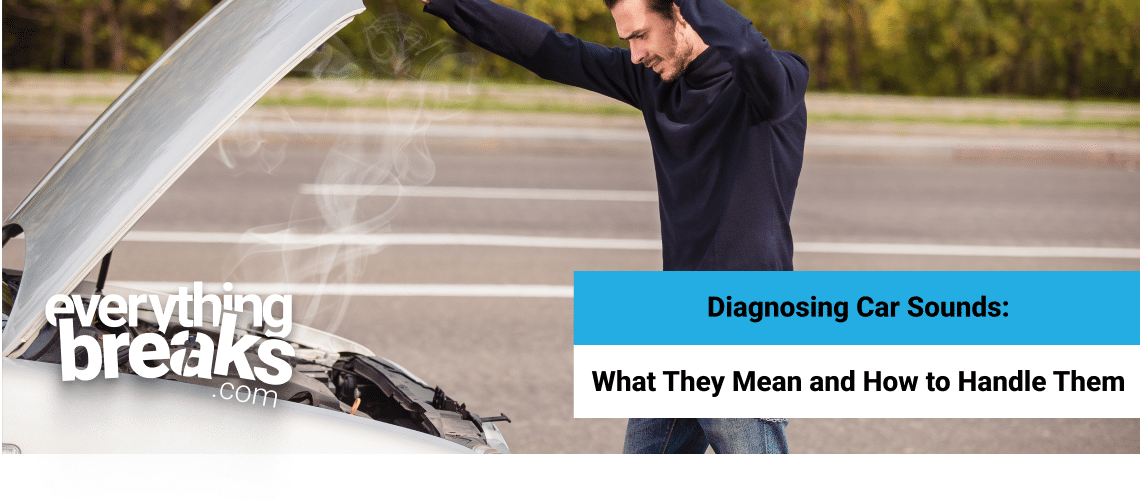If your car is making unusual noises, it’s trying to tell you something. Whether it’s faint clicking or a loud screech, strange sounds can indicate underlying issues that, if left unattended, will ultimately turn into costly repairs. Knowing what to listen for can help you address problems early on, prevent further damage, and potentially save thousands in repair costs. But diagnosing car sounds isn’t always straightforward. Different noises can mean different things depending on where they’re coming from and when they occur.
What do these noises mean, and what should you do if you hear them?
Squealing or Screeching While Braking
If your car emits a high-pitched squeal when you apply the brakes, this could be a sign that your brake pads are worn and need replacing. The squealing noise comes from a small metal shim built into the pads, designed to warn drivers that it’s time for new brakes before the pads wear out completely.
- What’s the Issue: worn brake pads.
- The Cost of Repair: replacing brake pads typically costs between $150 to $300 per axle, but if the pads wear down to the rotors, it can lead to a much more expensive repair—up to $600 or more per rotor.
- Don’t Ignore It: ignoring this noise can lead to the brake pads wearing down completely, damaging the rotors, and potentially leading to brake failure.
Grinding or Growling from the Wheels
A grinding noise coming from the wheels, particularly when turning, often indicates a problem with the wheel bearings. Wheel bearings are essential for smooth wheel rotation and support. If damaged or worn, they create a grinding sound that worsens over time.
- What’s the Issue: worn-out wheel bearings.
- Cost of Repair: replacing wheel bearings can cost between $300 to $500 depending on your car model.
- Don’t Ignore It: driving with faulty wheel bearings can be dangerous and may cause the wheel to seize up completely, leading to a potential accident.
Knocking Sound from the Engine
If you hear a knocking or pinging noise coming from under the hood, it could be a sign of engine detonation or pre-ignition. This happens when the fuel in the cylinder ignites unevenly, often due to low-quality fuel, faulty spark plugs, or carbon buildup in the combustion chamber.
- What’s the Issue: potential engine damage.
- Cost of Repair: depending on the severity, repairing an engine knocking issue can range from $1,000 to over $5,000.
- Don’t Ignore It: engine knocking can lead to severe damage to the pistons and other internal components, resulting in costly engine rebuilds or replacements.
Rattling Under the Car
A rattling noise coming from beneath your car might suggest a problem with your exhaust system, such as a loose heat shield or damaged catalytic converter. If it’s the catalytic converter, this noise could be accompanied by a drop in fuel efficiency and poor engine performance.
- What’s the Issue: loose exhaust component or failing catalytic converter.
- Cost of Repair: fixing a loose heat shield is relatively inexpensive, around $150 to $300, but replacing a catalytic converter can cost $1,000 to $2,500.
- Don’t Ignore It: a faulty catalytic converter can result in decreased engine performance and increased emissions, which might cause your vehicle to fail state inspections.
Hissing or Whistling from the Engine
If your engine bay emits a high-pitched hissing or whistling noise, it could indicate a vacuum leak or a problem with your vehicle’s cooling system. Vacuum leaks often result from broken hoses or gaskets, while a hissing sound from the radiator or coolant lines might signal a coolant leak.
- What’s the Issue: vacuum or coolant leak.
- Cost of Repair: repair costs for vacuum leaks are typically between $200 and $500, but addressing a coolant system leak can range from $300 to $1,000 depending on the affected components.
- Don’t Ignore It: ignoring a vacuum leak can lead to poor engine performance and reduced fuel efficiency, while a coolant leak can cause the engine to overheat, potentially leading to catastrophic engine damage.
Clunking When Going Over Bumps
A clunking or banging noise when driving over bumps is often a sign of a suspension problem, such as worn-out shock absorbers, struts, or stabilizer links. This noise indicates that your suspension isn’t absorbing impacts correctly, which can affect your car’s handling and ride comfort.
- What’s the Issue: damaged suspension components.
- Cost of Repair: suspension repairs can vary significantly depending on the component, ranging from $300 for shock replacement to $1,000 or more for complete suspension overhauls.
- Don’t Ignore It: driving with a faulty suspension can make your vehicle unsafe, as it impacts steering control and stability.
Why You Shouldn’t Ignore Strange Noises
Strange noises are your car’s way of telling you something is wrong. Ignoring them can lead to larger, more costly repairs down the road. What may start as a small issue with your brakes or suspension can quickly become a major repair if left unchecked. Beyond the financial impact, ignoring these signs can jeopardize your safety. A grinding wheel bearing, for example, can cause a wheel to lock up, while an engine knock can lead to complete engine failure.
Addressing these noises early on can help you avoid breakdowns, reduce repair costs, and keep your vehicle running safely. However, repair bills can add up quickly, even if you catch the problem early. That’s where an auto protection plan comes in.
An Auto Protection Plan Can Help!
With modern vehicles becoming more complex and repair costs rising, an auto protection plan can be a lifesaver. At Everything Breaks, our plans cover many of the expensive components that are prone to failure, from the engine and transmission to the suspension and electrical systems. By investing in an auto protection plan, you can be prepared for unexpected repairs without the worry of out-of-pocket costs!
Listen to Your Car!
If your car is making strange noises, don’t ignore them! For more information on how an auto protection plan can safeguard you from high repair costs, reach out to us today!








